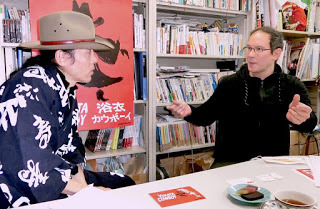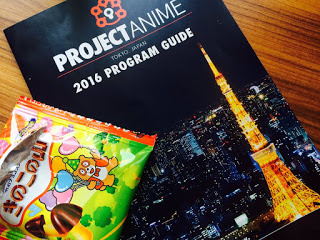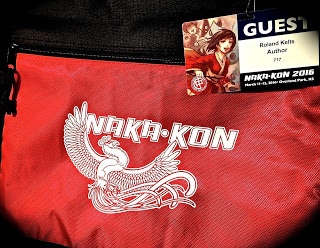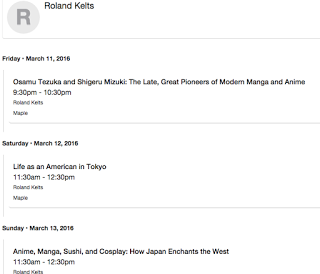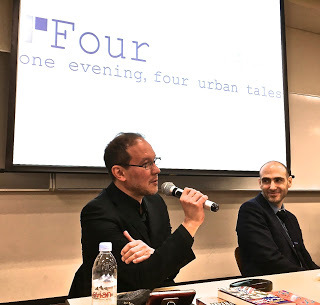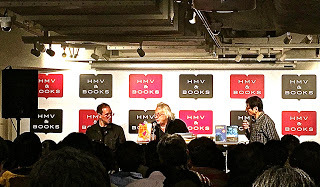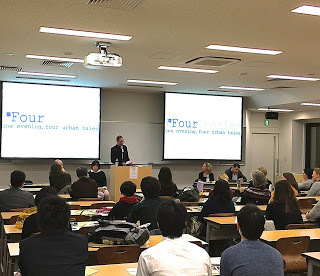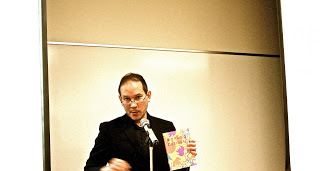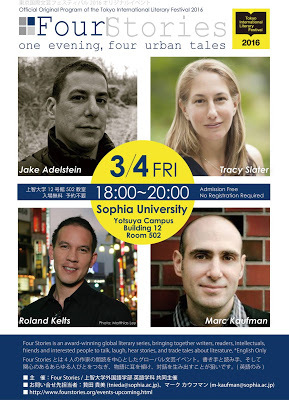Roland Kelts's Blog, page 26
April 4, 2016
Thank you, Tokyo Tour
Kinokuniya Bookstore, Shinjuku, Tokyo, 4/2:
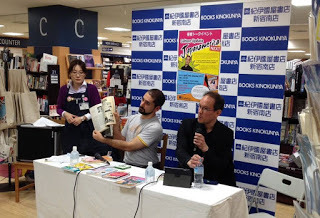
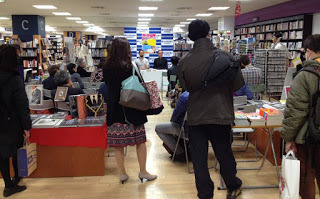
Tollywood, Shimokitazawa, Tokyo 4/1:
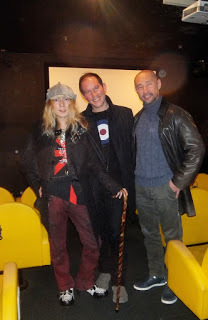

Sophia University, Yotsuya, Tokyo, 3/4:
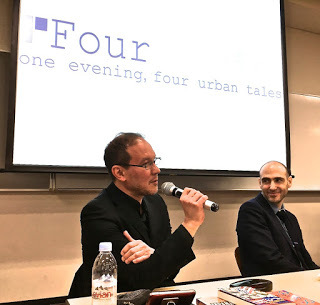
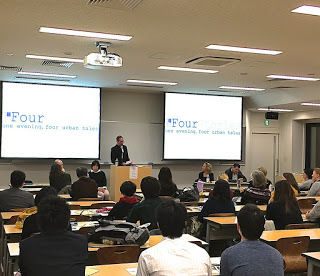
HMV Books, Shibuya, Tokyo, 3/6:
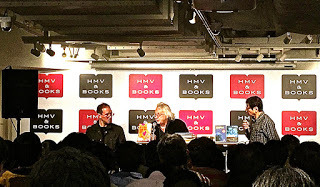
Published on April 04, 2016 03:18
March 30, 2016
Live in Tokyo, 4/1: Talk show w/director & actor Atsushi Ogata @ Shimokitazawa
Published on March 30, 2016 00:46
March 27, 2016
Live in Tokyo, Sat., 4/2: JAPANAMERICA / MONKEY talk, reading, signing @ KINOKUNIYA
 Books Kinokuniya Event
Books Kinokuniya EventCulture Update: "Japanamerica" Next
WHEN: April 2nd, Saturday 2016
TIME: 3:00 PM -
PLACE: 6th floor, event space Books Kinokuniya Tokyo
Event is free, no pre-registration necessary
Ten years have gone by since the publication of the bestseller "Japanamerica: How Japanese Pop Culture Has Invaded the US", one of the most popular texts on contemporary Japanese culture. With this book as the centerpiece, we hope to have a discussion on popular texts before and after "Japanamerica" to paint a landscape of Japanese contemporary culture today. The speakers are writer Roland Kelts, the author of "Japanamerica", and Benjamin Boas, the author of "Nihon no kotowa Manga to Game de Manabimashita (Everything I Learned, I Learned from Manga and Games)", who are both Tokyo residents and know pop culture inside and out!
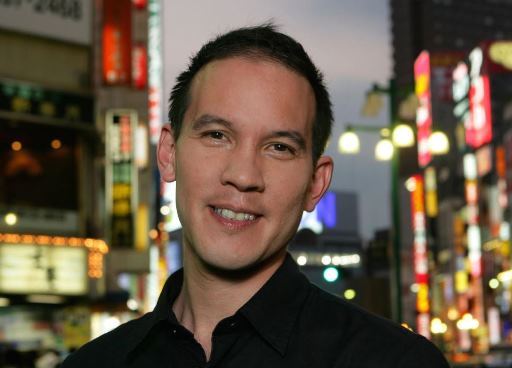
Roland Kelts is the author of the acclaimed bestseller, Japanamerica: How Japanese Pop Culture has Invaded the US. He is a Steering Committee Member of the Rebuild Japan Initiative Foundation, a Tokyo-based think tank.
He writes for many publications, including The New Yorker, Time magazine, Newsweek Japan, The New York Times, The Guardian and The Japan Times, and his fiction has appeared in Zoetrope: All Story, Playboy, A Public Space and others. Recently, Kelts gave talks at the World Economic Forum in China and for TED in Tokyo. He is a contributing editor of Monkey Business International, the annual English edition of a Japanese literary magazine, and his forthcoming novel is called Access.

Benjamin Boas is an American writer and translator. He has published work in English and Japanese with organizations including Shogakukan, Studio Ghibli, The Yomiuri Shimbun, and Daiwa Shobo. He serves Tokyo as Tourism Ambassador of its Nakano City, where he resides.

Published on March 27, 2016 18:39
March 23, 2016
March 21, 2016
Bringing Britain to Japan, for The Japan Times
From Cool Britannia to True Britannia
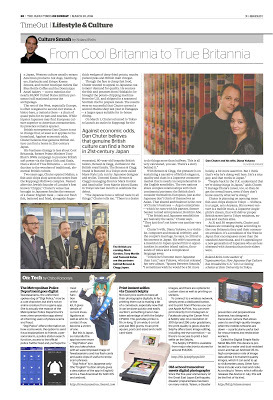
By ROLAND KELTS
In Japan, Western culture usually means American products: hot dogs, hamburgers, Starbucks and Krispy Kreme donuts, and recent boutique outlets like Blue Bottle Coffee and the Dominique Ansel bakery — not to mention the nearly 50,000 United States military personnel still stationed across the archipelago.
The rest of the West, especially Europe, is often relegated to second-tier status. A bistro here, a trattoria there — a chain of quasi-pubs for ex-pats and tourists. While hipster Japanese may find European culture superior to American consumerism, its presence remains sparser.
British entrepreneur Dan Chuter is out to change that, at least as it applies to his homeland. Against economic odds, Chuter believes that genuine British culture can find a home in 21st-century Japan.
Two years ago, Chuter opened Malins, a fish-and-chips shop across the street from the Roppongi Midtown complex. Named after the Jewish founder of London’s first known “chippy,” Chuter’s venue has brought to Japanese foodies the essence of a classic English meal — take-out fresh fish, battered and fried, alongside finger-thick wedges of deep-fried potato, mushy pureed peas and British malt vinegar.
Though the fare is cheap fast food, Chuter wanted to appeal to Japanese customers’ demand for quality. He sources the fish and potatoes from Hokkaido; he brought the potato-chipping machine from the U.K. and shipped in a seasoned Scottish chef to prepare meals. The results were so successful that Chuter opened a second Malins shop last year in Hatagaya — a larger space suitable for in-house dining.
On March 1, Chuter returned to Tokyo to launch an outlet in Roppongi for the venerated, 80-year-old bespoke British tailors, Benson & Clegg, clothiers to the British royal family. The Benson & Clegg brand is featured in a Tokyo store called Muse Style Lab, run by Japanese designer and stylist, Tomomi Katsu. Benson & Clegg’s managing director Mark Gordon and head tailor Tony Martin joined Katsu in Tokyo late last month to celebrate the debut.
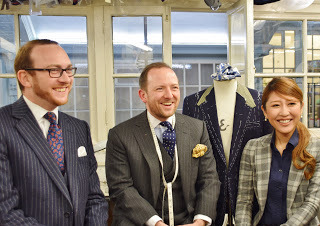
“The Japanese have a refined taste in all things,” Chuter tells me. “There is a desire to do things more than halfway. This is all very calculated, you see. There’s a story behind it.”
With Benson & Clegg, the pressure is on sustaining a narrative of British elegance, quality and class in a Japanese consumer market that is nearly incomprehensible to the English sensibility. The two nations share complex relationships with their continental partners: the British don’t consider themselves European, just as the Japanese don’t think of themselves as Asian. That shared ambivalence is the core of Chuter’s business — Argon Enterprise — which he runs with his partner, former banker turned entrepreneur, Koichiro Abe.
“The British and Japanese sensibilities are basically the same,” Chuter says. “They just don’t yet know one another very well.”
Chuter’s wife, Diana Yukawa, is a violinist, composer and musical celebrity, and the couple’s marriage, he says, is critical to his interest in Japan. His wife’s success as a musician in Japan opened him to opportunities in another island nation, thousands of miles and a complicated language away.
“I think he’s become more Japanese than I am,” says Yukawa, who just released her new album, “Spaces Between Shadows.” “I sometimes wish he would be a bit more bolshy, a bit more assertive. But I think that’s why he’s doing well here. He’s a nice guy, and that works in Japan.”

“People back in the U.K. understand that we’re doing things in Japan,” adds Chuter. “I manage Diana’s career, too, so they do get the overall story, even if they don’t know exactly what we’re doing.”
Chuter is planning on opening more fish-and-chips shops in Tokyo — Shibuya is a target, as is Aoyama. His newest venture is a mobile truck, a Japanese Anglophile’s dream, that will deliver proper British street fare to Tokyo residents, ex-pats and tourists alike.
At 31 and 30 respectively, Chuter and Yukawa are remaking Japan according to the true Britannia they and their consumers envision. It’s a rendition of the West in Japan that encompasses more than the standard Americana, and it’s appealing to a new generation of Japanese who are less obsessed with America than their elders were.
Roland Kelts is the author of “Japanamerica: How Japanese Pop Culture has Invaded the U.S.” He is a visiting scholar at Keio University in Tokyo.

By ROLAND KELTS
In Japan, Western culture usually means American products: hot dogs, hamburgers, Starbucks and Krispy Kreme donuts, and recent boutique outlets like Blue Bottle Coffee and the Dominique Ansel bakery — not to mention the nearly 50,000 United States military personnel still stationed across the archipelago.
The rest of the West, especially Europe, is often relegated to second-tier status. A bistro here, a trattoria there — a chain of quasi-pubs for ex-pats and tourists. While hipster Japanese may find European culture superior to American consumerism, its presence remains sparser.
British entrepreneur Dan Chuter is out to change that, at least as it applies to his homeland. Against economic odds, Chuter believes that genuine British culture can find a home in 21st-century Japan.
Two years ago, Chuter opened Malins, a fish-and-chips shop across the street from the Roppongi Midtown complex. Named after the Jewish founder of London’s first known “chippy,” Chuter’s venue has brought to Japanese foodies the essence of a classic English meal — take-out fresh fish, battered and fried, alongside finger-thick wedges of deep-fried potato, mushy pureed peas and British malt vinegar.
Though the fare is cheap fast food, Chuter wanted to appeal to Japanese customers’ demand for quality. He sources the fish and potatoes from Hokkaido; he brought the potato-chipping machine from the U.K. and shipped in a seasoned Scottish chef to prepare meals. The results were so successful that Chuter opened a second Malins shop last year in Hatagaya — a larger space suitable for in-house dining.
On March 1, Chuter returned to Tokyo to launch an outlet in Roppongi for the venerated, 80-year-old bespoke British tailors, Benson & Clegg, clothiers to the British royal family. The Benson & Clegg brand is featured in a Tokyo store called Muse Style Lab, run by Japanese designer and stylist, Tomomi Katsu. Benson & Clegg’s managing director Mark Gordon and head tailor Tony Martin joined Katsu in Tokyo late last month to celebrate the debut.

“The Japanese have a refined taste in all things,” Chuter tells me. “There is a desire to do things more than halfway. This is all very calculated, you see. There’s a story behind it.”
With Benson & Clegg, the pressure is on sustaining a narrative of British elegance, quality and class in a Japanese consumer market that is nearly incomprehensible to the English sensibility. The two nations share complex relationships with their continental partners: the British don’t consider themselves European, just as the Japanese don’t think of themselves as Asian. That shared ambivalence is the core of Chuter’s business — Argon Enterprise — which he runs with his partner, former banker turned entrepreneur, Koichiro Abe.
“The British and Japanese sensibilities are basically the same,” Chuter says. “They just don’t yet know one another very well.”
Chuter’s wife, Diana Yukawa, is a violinist, composer and musical celebrity, and the couple’s marriage, he says, is critical to his interest in Japan. His wife’s success as a musician in Japan opened him to opportunities in another island nation, thousands of miles and a complicated language away.
“I think he’s become more Japanese than I am,” says Yukawa, who just released her new album, “Spaces Between Shadows.” “I sometimes wish he would be a bit more bolshy, a bit more assertive. But I think that’s why he’s doing well here. He’s a nice guy, and that works in Japan.”

“People back in the U.K. understand that we’re doing things in Japan,” adds Chuter. “I manage Diana’s career, too, so they do get the overall story, even if they don’t know exactly what we’re doing.”
Chuter is planning on opening more fish-and-chips shops in Tokyo — Shibuya is a target, as is Aoyama. His newest venture is a mobile truck, a Japanese Anglophile’s dream, that will deliver proper British street fare to Tokyo residents, ex-pats and tourists alike.
At 31 and 30 respectively, Chuter and Yukawa are remaking Japan according to the true Britannia they and their consumers envision. It’s a rendition of the West in Japan that encompasses more than the standard Americana, and it’s appealing to a new generation of Japanese who are less obsessed with America than their elders were.
Roland Kelts is the author of “Japanamerica: How Japanese Pop Culture has Invaded the U.S.” He is a visiting scholar at Keio University in Tokyo.
Published on March 21, 2016 13:27
Cool Britannia to True Britannia, for The Japan Times
My latest column for
The Japan Times
.

By ROLAND KELTS
In Japan, Western culture usually means American products: hot dogs, hamburgers, Starbucks and Krispy Kreme donuts, and recent boutique outlets like Blue Bottle Coffee and the Dominique Ansel bakery — not to mention the nearly 50,000 United States military personnel still stationed across the archipelago.
The rest of the West, especially Europe, is often relegated to second-tier status. A bistro here, a trattoria there — a chain of quasi-pubs for ex-pats and tourists. While hipster Japanese may find European culture superior to American consumerism, its presence remains sparser.
British entrepreneur Dan Chuter is out to change that, at least as it applies to his homeland. Against economic odds, Chuter believes that genuine British culture can find a home in 21st-century Japan.
Two years ago, Chuter opened Malins, a fish-and-chips shop across the street from the Roppongi Midtown complex. Named after the Jewish founder of London’s first known “chippy,” Chuter’s venue has brought to Japanese foodies the essence of a classic English meal — take-out fresh fish, battered and fried, alongside finger-thick wedges of deep-fried potato, mushy pureed peas and British malt vinegar.
Though the fare is cheap fast food, Chuter wanted to appeal to Japanese customers’ demand for quality. He sources the fish and potatoes from Hokkaido; he brought the potato-chipping machine from the U.K. and shipped in a seasoned Scottish chef to prepare meals. The results were so successful that Chuter opened a second Malins shop last year in Hatagaya — a larger space suitable for in-house dining.
On March 1, Chuter returned to Tokyo to launch an outlet in Roppongi for the venerated, 80-year-old bespoke British tailors, Benson & Clegg, clothiers to the British royal family. The Benson & Clegg brand is featured in a Tokyo store called Muse Style Lab, run by Japanese designer and stylist, Tomomi Katsu. Benson & Clegg’s managing director Mark Gordon and head tailor Tony Martin joined Katsu in Tokyo late last month to celebrate the debut.

“The Japanese have a refined taste in all things,” Chuter tells me. “There is a desire to do things more than halfway. This is all very calculated, you see. There’s a story behind it.”
With Benson & Clegg, the pressure is on sustaining a narrative of British elegance, quality and class in a Japanese consumer market that is nearly incomprehensible to the English sensibility. The two nations share complex relationships with their continental partners: the British don’t consider themselves European, just as the Japanese don’t think of themselves as Asian. That shared ambivalence is the core of Chuter’s business — Argon Enterprise — which he runs with his partner, former banker turned entrepreneur, Koichiro Abe.
“The British and Japanese sensibilities are basically the same,” Chuter says. “They just don’t yet know one another very well.”
Chuter’s wife, Diana Yukawa, is a violinist, composer and musical celebrity, and the couple’s marriage, he says, is critical to his interest in Japan. His wife’s success as a musician in Japan opened him to opportunities in another island nation, thousands of miles and a complicated language away.
“I think he’s become more Japanese than I am,” says Yukawa, who just released her new album, “Spaces Between Shadows.” “I sometimes wish he would be a bit more bolshy, a bit more assertive. But I think that’s why he’s doing well here. He’s a nice guy, and that works in Japan.”

“People back in the U.K. understand that we’re doing things in Japan,” adds Chuter. “I manage Diana’s career, too, so they do get the overall story, even if they don’t know exactly what we’re doing.”
Chuter is planning on opening more fish-and-chips shops in Tokyo — Shibuya is a target, as is Aoyama. His newest venture is a mobile truck, a Japanese Anglophile’s dream, that will deliver proper British street fare to Tokyo residents, ex-pats and tourists alike.
At 31 and 30 respectively, Chuter and Yukawa are remaking Japan according to the true Britannia they and their consumers envision. It’s a rendition of the West in Japan that encompasses more than the standard Americana, and it’s appealing to a new generation of Japanese who are less obsessed with America than their elders were.
Roland Kelts is the author of “Japanamerica: How Japanese Pop Culture has Invaded the U.S.” He is a visiting scholar at Keio University in Tokyo.

By ROLAND KELTS
In Japan, Western culture usually means American products: hot dogs, hamburgers, Starbucks and Krispy Kreme donuts, and recent boutique outlets like Blue Bottle Coffee and the Dominique Ansel bakery — not to mention the nearly 50,000 United States military personnel still stationed across the archipelago.
The rest of the West, especially Europe, is often relegated to second-tier status. A bistro here, a trattoria there — a chain of quasi-pubs for ex-pats and tourists. While hipster Japanese may find European culture superior to American consumerism, its presence remains sparser.
British entrepreneur Dan Chuter is out to change that, at least as it applies to his homeland. Against economic odds, Chuter believes that genuine British culture can find a home in 21st-century Japan.
Two years ago, Chuter opened Malins, a fish-and-chips shop across the street from the Roppongi Midtown complex. Named after the Jewish founder of London’s first known “chippy,” Chuter’s venue has brought to Japanese foodies the essence of a classic English meal — take-out fresh fish, battered and fried, alongside finger-thick wedges of deep-fried potato, mushy pureed peas and British malt vinegar.
Though the fare is cheap fast food, Chuter wanted to appeal to Japanese customers’ demand for quality. He sources the fish and potatoes from Hokkaido; he brought the potato-chipping machine from the U.K. and shipped in a seasoned Scottish chef to prepare meals. The results were so successful that Chuter opened a second Malins shop last year in Hatagaya — a larger space suitable for in-house dining.
On March 1, Chuter returned to Tokyo to launch an outlet in Roppongi for the venerated, 80-year-old bespoke British tailors, Benson & Clegg, clothiers to the British royal family. The Benson & Clegg brand is featured in a Tokyo store called Muse Style Lab, run by Japanese designer and stylist, Tomomi Katsu. Benson & Clegg’s managing director Mark Gordon and head tailor Tony Martin joined Katsu in Tokyo late last month to celebrate the debut.

“The Japanese have a refined taste in all things,” Chuter tells me. “There is a desire to do things more than halfway. This is all very calculated, you see. There’s a story behind it.”
With Benson & Clegg, the pressure is on sustaining a narrative of British elegance, quality and class in a Japanese consumer market that is nearly incomprehensible to the English sensibility. The two nations share complex relationships with their continental partners: the British don’t consider themselves European, just as the Japanese don’t think of themselves as Asian. That shared ambivalence is the core of Chuter’s business — Argon Enterprise — which he runs with his partner, former banker turned entrepreneur, Koichiro Abe.
“The British and Japanese sensibilities are basically the same,” Chuter says. “They just don’t yet know one another very well.”
Chuter’s wife, Diana Yukawa, is a violinist, composer and musical celebrity, and the couple’s marriage, he says, is critical to his interest in Japan. His wife’s success as a musician in Japan opened him to opportunities in another island nation, thousands of miles and a complicated language away.
“I think he’s become more Japanese than I am,” says Yukawa, who just released her new album, “Spaces Between Shadows.” “I sometimes wish he would be a bit more bolshy, a bit more assertive. But I think that’s why he’s doing well here. He’s a nice guy, and that works in Japan.”

“People back in the U.K. understand that we’re doing things in Japan,” adds Chuter. “I manage Diana’s career, too, so they do get the overall story, even if they don’t know exactly what we’re doing.”
Chuter is planning on opening more fish-and-chips shops in Tokyo — Shibuya is a target, as is Aoyama. His newest venture is a mobile truck, a Japanese Anglophile’s dream, that will deliver proper British street fare to Tokyo residents, ex-pats and tourists alike.
At 31 and 30 respectively, Chuter and Yukawa are remaking Japan according to the true Britannia they and their consumers envision. It’s a rendition of the West in Japan that encompasses more than the standard Americana, and it’s appealing to a new generation of Japanese who are less obsessed with America than their elders were.
Roland Kelts is the author of “Japanamerica: How Japanese Pop Culture has Invaded the U.S.” He is a visiting scholar at Keio University in Tokyo.
Published on March 21, 2016 13:27
March 11, 2016
Hello, Kansas! Naka-Kon 2016 sched
Published on March 11, 2016 09:34
March 10, 2016
Thank you, Tokyo Lit Fest (TILF) 2016
Published on March 10, 2016 15:16
March 2, 2016
Reading tomorrow night, 3/4, for Tokyo International Literary Festival
Published on March 02, 2016 20:18
February 22, 2016
2/25, Tokyo: Public conversation w/this year's International Manga Award winners
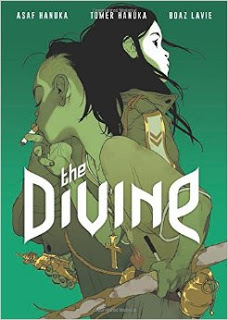 (JP announcement)
(JP announcement)Seijo University
Faculty of Arts and Literature Lecture
Israel and Manga: A Public Conversation with Asaf Hanuka and Boaz Lavie
Winners of the Foreign Ministry of Japan’s 9th International MANGA Award.
Date: Thursday, February 25, 2016 Time: 13:30~15:30
Venue: Room 321, building 3 Admission: Free
At this event, Asaf Hanuka and Boaz Lavie, winners of the Foreign Ministry of Japan’s 9th International MANGA Award, will speak about their award-winning graphic novel, The Divine (2015) and then will join writer and journalist Roland Kelts in a public conversation about their work as well as the current state of manga in Israel. After their conversation, Mr. Hanuka and Mr. Lavie will answer questions from the audience.
This event is sponsored by the Faculty of Arts and Literature, Seijo University, with support from the Embassy of Israel in Japan and the Japan Foundation
For further information, please contact:
Dr. Ryuma Shineha, Faculty of Arts and Literature, Seijo University: r_shineha@seijo.ac.jp.
Published on February 22, 2016 20:17

